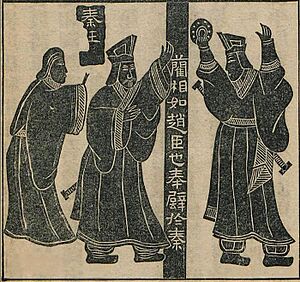Lin Xiangru facts for kids
Lin Xiangru (Chinese: 藺相如; pinyin: Lìn Xiāngrú) was a smart politician and general. He lived in ancient China during the Warring States period. This was a time when different states fought for power. Lin Xiangru served the state of Zhao. He is famous for two important stories. One is about "Returning the Jade to Zhao". The other is "Carrying Thorned Grass and Pleading Guilt". These stories show his wisdom and humility.
Contents
Lin Xiangru's Early Life
Lin Xiangru was born in a place called Mengmen town. This was during the time of King Wuling of Zhao. He was very intelligent and had great skills. Because of this, he quickly became an important official. He moved up fast in the government of Zhao.
Returning the Jade to Zhao
One day, messengers from the King of Qin visited the Zhao court. They offered to trade fifteen cities for a special jade disk. This jade was called the Heshibi. At this time, the Qin state was very powerful. It was hard for Zhao to say no to their offer.
However, the Kings of Qin were known for not keeping their promises. King Huiwen of Zhao did not trust the King of Qin. Lin Xiangru bravely offered to go to the Qin court. He promised to give the jade only if the King of Qin gave the cities. If not, he would bring the jade back safely.
At the Qin court, the King of Qin showed off the Heshibi. He passed it around to his officials and royal family. But he did not mention the fifteen cities he had promised. Lin Xiangru realized the King of Qin was not going to keep his word.
Lin Xiangru then tricked the King of Qin. He said there was a tiny flaw in the jade. When the King of Qin gave the jade back to him to see the flaw, Lin grabbed it. He threatened to smash the jade if the King did not act properly. Lin demanded the King fast for three days. He also asked for a proper ceremony before he would hand over the jade. The King of Qin did not want the precious jade to be destroyed. So, he agreed to Lin's demands.
That night, Lin still did not trust the King of Qin. He secretly sent the jade back to Zhao with one of his helpers. Lin himself stayed in Qin to face the King. Three days later, the King of Qin was very angry. He found out the jade had been returned to Zhao. But he could not punish Lin Xiangru. He did not want to harm a diplomat from Zhao. So, he had to let Lin go.
This event made Lin Xiangru famous. People across the Warring States knew him as the man who outsmarted the Qin king. His position in Zhao grew quickly. Soon, he became the chief minister of Zhao.
Carrying Thorned Grass and Pleading Guilt
Lin Xiangru's quick rise made many people jealous. One of them was the old general Lian Po. Lian Po was a very experienced military leader. He was so jealous that he swore to cause trouble for Lin. When Lin Xiangru heard about this, he decided not to confront Lian Po.
In one situation, Lian Po's and Lin Xiangru's carriages met on a narrow road. Lin Xiangru was a higher-ranking official. Normally, he would have the right to pass first. However, he turned his carriage around. He backed away to let Lian Po pass.
Many people saw this as a sign of weakness. Lian Po himself thought Lin was scared of him. Even Lin's own helpers were unhappy. They thought Lin was acting too humbly. Many of them left him. But Lin's main helper asked him why he was acting this way.
Lin Xiangru explained his actions. He said, "My disagreement with Lian Po is a personal matter. But I am in charge of the government. He is in charge of the nation's safety. I cannot let our personal feelings harm our country!"
When Lian Po finally heard Lin's words, his jealousy turned into shame. He decided to apologize to Lin. He tied thorny branches to his bare back. Then, he walked from his house to Lin Xiangru's house. He begged Lin for forgiveness. Lin Xiangru forgave him right away. From that day on, they became good friends. The strong partnership between the chief minister and the general kept Zhao peaceful for many years.
Later Events
Lin Xiangru became very ill later in his life. At that time, General Lian Po was about to be replaced. A much younger and less experienced general, Zhao Kuo, was chosen to lead the army. This was for the important Battle of Changping. Lin Xiangru begged King Xiaocheng of Zhao to change his mind. However, the King did not listen to Lin's advice.
Sadly, a disaster followed in the battle. Lin Xiangru likely died around the time Zhao suffered its final defeat at the Battle of Changping.
Legacy
- A famous poet from the Western Han Dynasty, Sima Xiangru, admired Lin Xiangru greatly. He even named himself after Lin Xiangru because of this admiration.
 | Bessie Coleman |
 | Spann Watson |
 | Jill E. Brown |
 | Sherman W. White |


